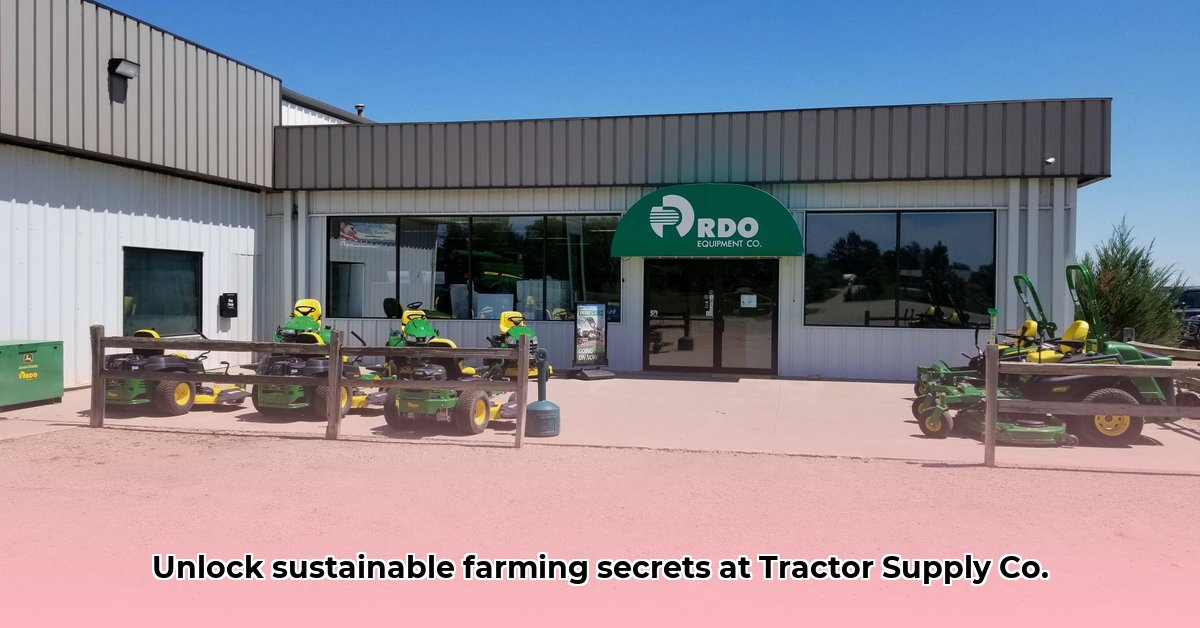
Sustainable agriculture is gaining momentum, and Tractor Supply Co. (TSC) in Dilworth, Minnesota, offers a range of products to support local farmers and gardeners in their eco-conscious endeavors. This guide explores TSC's offerings, provides practical advice for implementing sustainable practices, and identifies areas for improvement. For more information on soil health, check out this helpful resource: TSC Garden Soil Guide.
TSC Dilworth's Sustainable Agriculture Product Offerings
TSC Dilworth offers various products that contribute to sustainable farming and gardening practices. However, the availability of explicitly labeled "sustainable" items may vary.
Livestock Feed: Nourishing Animals Responsibly
Choosing the right livestock feed significantly impacts animal welfare and environmental sustainability. TSC Dilworth offers various feed options, including non-GMO choices. However, the availability of certified organic feeds may be limited. Inquiring with TSC staff about sourcing and ingredient details is crucial for making informed decisions that align with your sustainability goals. The presence of non-GMO choices is a positive step, though greater organic options would broaden consumer choices.
Gardening Supplies: Cultivating a Thriving and Eco-Friendly Garden
Building a sustainable garden starts with the right supplies. TSC Dilworth provides a selection of organic seeds and soil amendments; enriching your soil with compost, for example, boosts fertility and reduces reliance on chemical fertilizers, a key tenet of sustainable gardening. The availability of Integrated Pest Management (IPM) compatible products (methods minimizing pesticide use) can vary. Asking TSC staff about natural pest control options like beneficial insects or insecticidal soaps is worthwhile. Water-efficient irrigation tools, such as drip irrigation systems or soaker hoses, are also key to water conservation – a critical aspect of sustainable agriculture. Their presence would significantly improve water usage efficiency.
Essential Tools and Equipment: Investing in Durable and Sustainable Solutions.
Beyond supplies, the tools and equipment used significantly impact sustainable practices. TSC likely stocks durable fencing materials suitable for rotational grazing, a sustainable livestock management technique. Investing in high-quality tools ensures longevity, reducing waste over time and aligning well with the principles of sustainability.
A Practical Guide to Sustainable Farming Using TSC Products
Let's translate TSC's offerings into actionable steps for sustainable farming:
Prioritize Soil Health: Begin with a soil test (kits often available at TSC) to understand nutrient levels. Then amend your soil using TSC's organic options to improve structure and fertility. This fundamental step underpins successful sustainable agriculture.
Master Water Management: Utilize water-efficient irrigation methods (drip irrigation, soaker hoses) to minimize water waste. Consider collecting rainwater for irrigation if feasible. Efficient water use is crucial for environmental responsibility.
Embrace Integrated Pest Management (IPM): Prioritize pest prevention techniques like healthy soil and crop rotation. If TSC offers natural pest control options, use them. Chemical pesticides should be the last resort. IPM methods significantly reduce environmental impact.
Implement Sustainable Livestock Practices (where applicable): If raising livestock, choose non-GMO or organic feeds whenever possible. Rotational grazing (where feasible and using TSC's fencing options) improves pasture health and reduces overgrazing. Sustainable livestock practices involve the entire lifecycle, from feed to pasture management.
Gaps and Opportunities at TSC Dilworth: A Call for Improvement
While TSC offers numerous products supporting sustainable practices, opportunities exist for growth. Expanding the selection of certified organic products and providing clear labeling with information regarding product sourcing (transparency is key) and environmental impact would significantly enhance TSC’s commitment to sustainable agriculture. Similarly, offering educational resources or workshops on sustainable practices would further solidify TSC’s position as a community resource for environmentally conscious farmers and gardeners.
Conclusion: Partnering for a Sustainable Future
Tractor Supply Co. in Dilworth provides a valuable starting point for those pursuing sustainable farming practices. By making informed purchase decisions, actively engaging with TSC staff to advocate for a wider range of sustainable products, and adopting the practices outlined in this guide, together we can contribute to a more environmentally conscious agricultural landscape in Dilworth. Remember, even small changes can contribute to a significant collective impact.